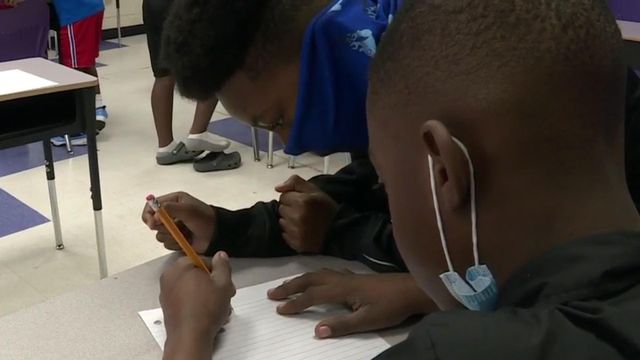Summer school programs in eastern NC look to offset impacts of virtual learning, digital divide
Virtual learning during the pandemic was particularly hard on students in rural North Carolina because of limited internet access, so in-person summer learning camps are trying to get students caught up before the new school year starts in August.
Posted — UpdatedNash Edgecombe Wilson Community Action donated $60,000 to help more than 100 students attend the summer program across three locations in the three counties. The summer program is held every year to keep students learning between grade levels, but this year, program leaders said the effort is more important than ever.
“Virtual learning isn’t for everyone, and we just answered the call,” said Nichelle Cole, interim executive director of Nash Edgecombe Wilson Community Action. "It sounds small, but we’re hoping it makes a great impact."
Organizers said many students in eastern North Carolina saw their learning suffer over the past year due to the area’s digital divide, as children struggled to learn virtually in homes without access to broadband.
WRAL Data Trackers analyzed information from the National Telecommunications and Information Administration and found that all three locations where the summer programs are based were in need of more broadband connectivity, and all had a median internet speed less than the federal standard.
The data showed that more than 27 percent of homes near Stocks Elementary School in Tarboro, the site of one camp, didn’t have internet access.
The same went for 27.5 percent of households near the Nash County program, and more than 30 percent of homes around the Wilson camp had no access to broadband.
"Some people didn’t have hotspots, [and] actually having access to a computer, some families maybe didn’t have that, or they had to share one computer with multiple children," Cole said. "[Also], having to watch over their child while their child was trying to do work was kind of time intensive, especially if they had multiple children."
With schools set to return to in-person learning in the fall, program leaders are hoping to make up for lost time.
“Putting your hands on the book, having the teacher there to talk to them and really explain things to them, can help children just kind of get back into the swing of things before school actually starts,” Cole said.
Each of the day camps will run for six weeks before wrapping up by early August.
"Parents have told us that they appreciate that they can now, because some of them are going back to work, now they have somewhere in the summer where they feel comfortable that their child is safe and learning some of the things that they lost during the school year," she said. "They’re definitely excited that they can bring their child here, their grandchild here, and they can get some things that were lost."
• Credits
Copyright 2024 by Capitol Broadcasting Company. All rights reserved. This material may not be published, broadcast, rewritten or redistributed.






